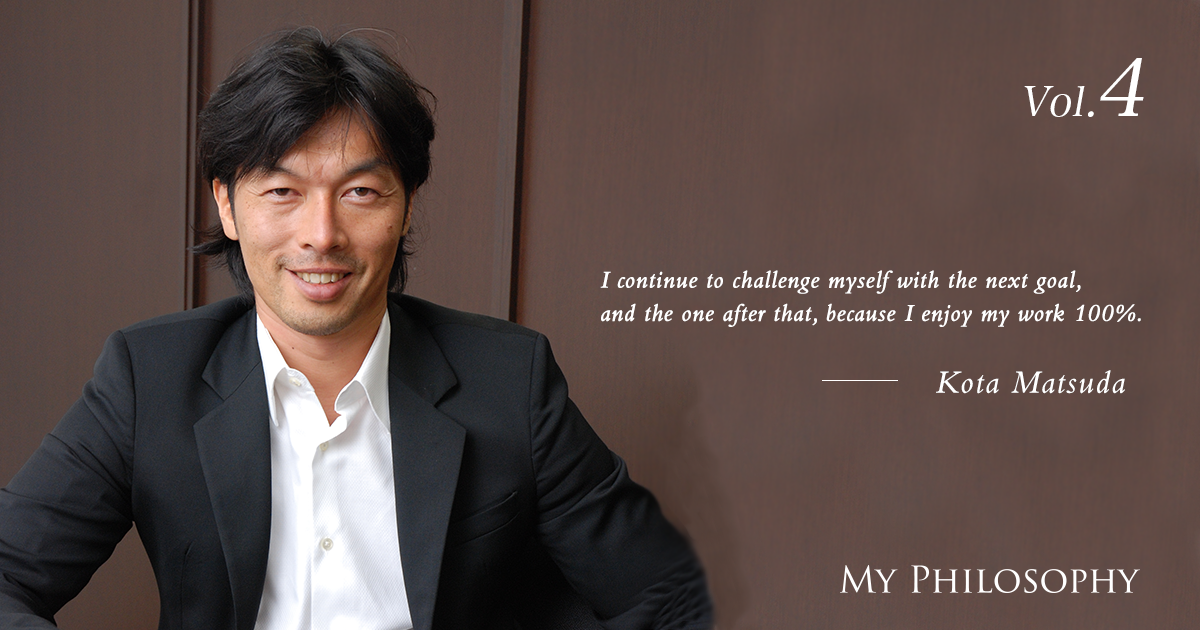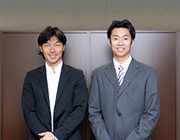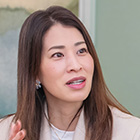
In 1997, at the age of 28, Kota Matsuda opened the first Tully's Coffee Japan store in Ginza. As of 2008, Tully's Coffee Japan has expanded to 300 stores nationwide. We asked about the motivation and journey leading to the opening of the first Tully's store, the current situation, and the future development as the chairman of Tully's International.
Profile
Vol.4 Kota Matsuda
Chairman of Tully's Coffee International | President of Quiznos Asia Pacific
After graduating from the International Studies program at Tsukuba University, Kota Matsuda entered The Sanwa Bank, Limited (now MUFG Bank, Ltd.). In June 1996, he left the bank and in September, he began negotiations with the Tully's headquarters in Seattle. After more than a year of negotiations, he acquired the management rights for Tully's in Japan. In 1997, he opened the first store in Ginza, Tokyo. In 1998, he established Tully's Coffee Japan, Inc., and in 2001, the company was listed on NASDAQ Japan (now Nippon New Market Hercules) at the fastest pace in the food and beverage industry at the time. In 2008, he founded Tully's International and assumed the position of President of Asia Pacific region for Quiznos, shifting his focus to the Asia-Pacific and other countries, and began the challenge from zero once again.
In 2010, he was elected to the Tokyo constituency of the House of Councillors for the first time (Your Party).
*The titles and information provided are as of the time of the interview in June 2008.
Encounters with Diverse “Food”

Growing up in Senegal, Africa, from the age of five, I believe the locals, although accustomed to seeing white people, still found East Asians to be an exotic presence. Personally, I naturally blended into the local lifestyle, not particularly conscious of racial or cultural differences. However, I experienced a cultural shock in terms of food, in a sense of awe and surprise. While my family would enjoy sea urchin, remarking on its deliciousness, our African friends would look on in bewilderment, asking, “What is that?” I was surprised to learn that what is considered a delicacy in Japan could be seen as bizarre in Africa, which sparked my interest in food.
Being close to Europe, my family traveled to various countries during the summer holidays. In every country, there were always new foods to discover, and I found great joy in encountering numerous local specialties. In the Netherlands, I was impressed by the visually impactful Gouda cheese. Having only eaten processed cheese before, I was amazed that cheese could be red and large, and learning about how cheese is made was a revelation in itself. I even spent all my pocket money on Gouda cheese at one point. These experiences from my childhood made me realize that the joy of tasting something delicious leads to an interest in that country.
Building Cultural Bridges Through Food
About 30 years ago, when I lived in America, the idea of raw fish was utterly unacceptable to my local friends; they simply couldn’t stomach it. This saddened me, but on the other hand, it made me think: if they could find it delicious, wouldn’t they come to like Japan as well? If raw fish was a barrier due to racial prejudices, removing that barrier might spark an interest in visiting Japan to enjoy delicious sushi, potentially increasing tourism.
This belief was further influenced by an experience with a girlfriend I had at the time in the United States. She became interested in Japanese manga because of me and expressed a desire to visit Akihabara someday to experience anime in its homeland. Her transition from knowing nothing about Japan to expressing a desire to visit moved me deeply. I earnestly believed that if we could spread Japanese cuisine and make it loved by many, it would naturally make people want to visit Japan.
There’s also a hope that this desire to experience authenticity can lead to cultural exchange. Food could be the starting point for developing a fondness for each other’s countries, fostering genuine friendships. This led me to the realization that I wanted to work in a field that carries various cultures through the medium of food.
Tully’s Coffee

During the hostile takeover bid in 2006, my underlying desire was to spread Tully’s Coffee further, which led me to prioritize building an organization and establishing American-style governance. However, with 5 out of 7 directors being external, each had their own agenda and a need to consider profits, which diverted us from the real mission of improving Tully’s Coffee. In the end, by standing firm to the end, ITO EN, LTD. Looking back, I see it as a valuable experience for my personal growth.
The reason behind the MBO (Management Buy-Out) and TOB (Takeover Bid) was to merge with Tully’s Coffee Corporation in the US. The plan was to list on NASDAQ in the US., hold all managerial rights as CEO, rectify the management in the US., and then expand into Asia. However, I couldn’t obtain the signature from the founders on the American side, so I fully secured the trademark rights through acquisition, but that goal was not fully realized.
However, looking back on what I’ve accomplished, I find myself almost exactly where I wanted to be. While my ultimate goal spans the entire world, I’ve set a more immediate objective of expanding throughout the Asia Pacific, and so far, that’s been sufficiently fulfilling. What’s crucial is having a clear goal. There will inevitably be deviations from the path. In pursuing major goals every five years, there might be annual targets that aren’t met, and course corrections may be necessary. But it’s because I’ve consistently aimed for a clear objective that I stand where I am today.
Differences in corporate culture between Japan and the US
The decision to start my own business may have been influenced by my life abroad. Had I lived in Japan, such a mindset might not have developed as much. In America, I witnessed firsthand the transformation of a friend’s family’s life after his father started his own company and achieved success. I understood, even as a child, that working for oneself and succeeding could lead to a better life, where effort directly translates to reward.
In Japan, however, even if someone starts a company and becomes hugely successful, there doesn’t seem to be a culture of wholehearted admiration for such achievements. Thus, when Japanese children are surveyed about what they want to be in the future, they often choose professions with a stable image, such as civil servants.
When asking new graduates if they want to be a president of a company, only about 10% say yes. The reasons given are usually about it seeming “too hard” or involving “too much responsibility.” There’s a story I heard about an employee who, as a child, saved money to buy a robot, then rented it out to many friends who wanted to use it, charging 100 yen a day and successfully recouping the cost of the toy. However, instead of being praised, the child was scolded by their parents. I think I would have praised them. This might be indicative of a culture in Japan where earning money isn’t always seen as something good.
My Philosophy

My motto has always been “No fun, no gain,” and I embrace this by enjoying my work 100%. For instance, I believe that World Cup-class soccer players, even on their days off, choose to play soccer not because they have to, but because they enjoy it. It’s their passion that allows them to excel. As they improve, they can feel their growth, making life joyously revolve around soccer. Similarly, for those who find their work enjoyable and have a sense of purpose, their job becomes their hobby. It’s the enjoyment that sustains them, allowing them to pursue the next goal without feeling burdened. The effort put in is reflected in the results, making it easier to set and follow through with goals. I believe that maintaining a positive outlook, setting goals, and striving for incremental improvement is crucial for living a fulfilling life, rather than just maintaining the status quo.

The existence of Tully’s Coffee Japan today is a testament to Mr. Matsuda’s persistent positive energy and his unwavering commitment to his goals. It was clear from our conversation that his belief, “My desire to do this outweighs any difficulties,” serves as the driving force behind achieving his objectives. This interview deeply impressed upon me the importance of creating an environment for oneself that fosters continuous growth, which is vital for sustaining long-term management.
June 2008, at the Tully’s Coffee International Tokyo Office,Edited by: Naomi Kusuda,Photographed by: Daiki Ayuzawa































































































































